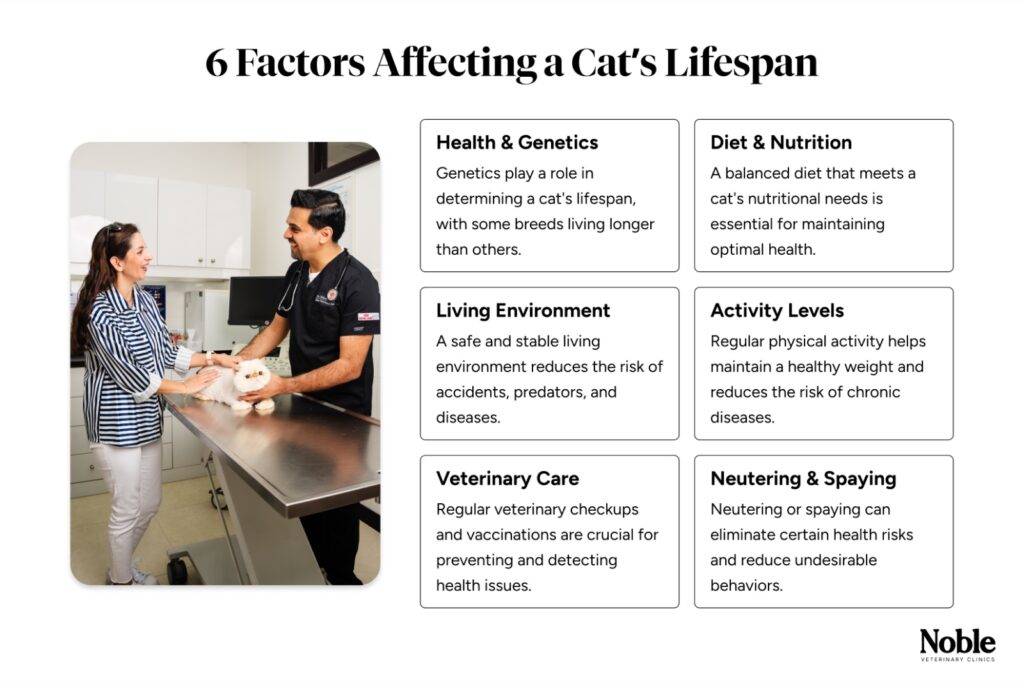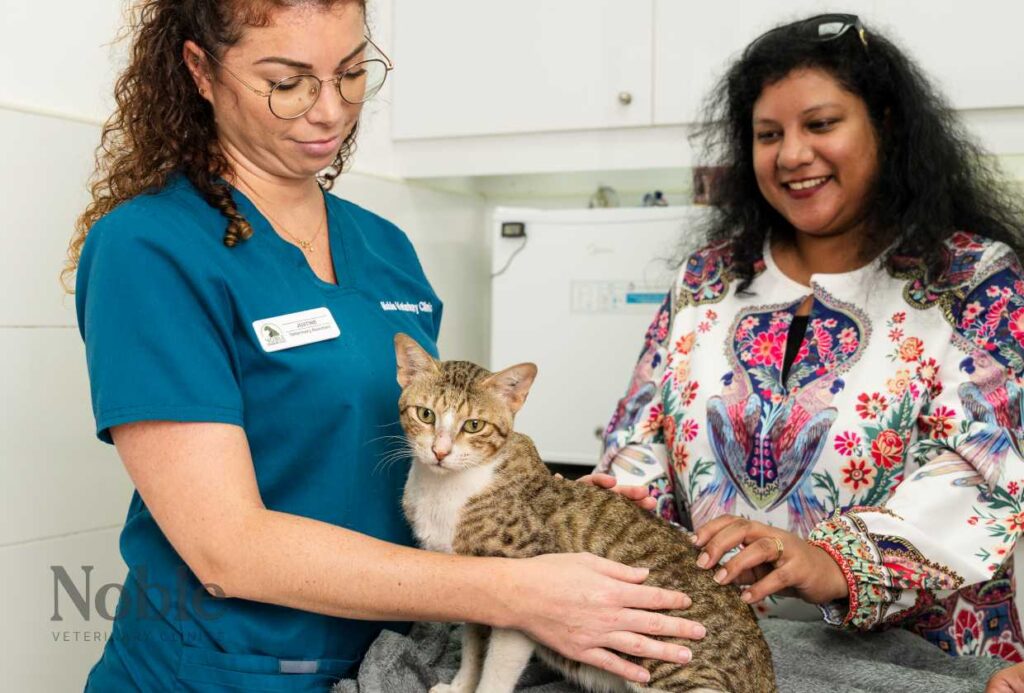
Despite the common saying that cats have nine lives, it’s not really the case, especially if certain factors come into the picture.
If you compare it to a dog’s lifespan, the average life of a cat is certainly longer. Still, factors like the living environment, vet care access, and lifestyle affect how long it can live.
We’ll discuss the factors that affect a cat’s lifespan and what you can do as a cat owner to help your feline pet live longer, healthier, and happier.
What Is the Average Cat Lifespan?
The average lifespan of a domestic cat can depend on several factors. First is whether your cat stays mostly indoors or loves playing outdoors. Next is whether your cat’s lifestyle is active or sedentary.
- Indoor vs. Outdoor Cats
Indoor cats generally have a longer lifespan that may range from 10 to 20 years. As for outdoor cats, they often live an average of 2 to 5 years. The significant difference in their lifespans is because outdoor cats are exposed to many dangers, such as predators, diseases, and vehicles.
- Sedentary vs. Active Cats
Physical activity also plays a big role in the longevity of a cat’s life. Both indoor and outdoor cats need enough exercise so they can have a healthier body. Cats that are docile and sedentary are prone to obesity and other weight-related illnesses.
In very rare cases, some cats exceed the expected lifespan, like Creme Puff, the oldest cat that’s ever recorded in history. Creme Puff was a cat from the U.S. that was able to live up to 38 years before passing away in 2005.
Some unfortunate cats who have been abandoned have very few chances for long, happy lives. In Dubai, where pet abandonment is a big problem, many cats on the streets become ill or get into accidents. That’s why many rescue groups and local vet clinics are promoting cat adoption to give homeless cats another shot at life.

Factors that Affect the Lifespan of Cats
Being an active, indoor cat is not the only reason that can help your feline pet have a long life. Here are other factors that determine how long a cat can live.
- Health and Genetics: There are certain cat breeds, like the Birman and Burmese, that have been known to live longer compared to other breeds.
- Diet and Nutrition: Cats need a healthy, balanced diet, depending on their age, so they can have optimal long-term health.
- Living Environment: If a cat lives in a dangerous environment, they have higher risks of accidents, predators, and contagious diseases.
- Activity Levels: Overweight cats are prone to many diseases, so it’s important to engage cats in physical activities to help them manage their weight.
- Veterinary Care: Taking your cat to the vet regularly for vaccination schedules and health checks helps in prolonging its life. Dubai vet clinics recommend cat owners when they should bring their cats in for checkups depending on their lifestyle and health condition.
- Neutering and Spaying: Neutering a cat can eliminate the risks of certain cancers and diseases. It also reduces the environmental risks that may be caused by roaming behavior.

Tips to Maximize Your Cat’s Lifespan
Now that you know the factors that affect a cat’s lifespan, here’s what you can do to help your feline companion live a longer life.
- Schedule Regular Vet Visits
Taking your cat to the vet once or twice a year is advisable. Vets can diagnose and determine early symptoms of serious illnesses to treat them before they get worse. During your visits, your vet may also recommend treatments to help prevent illnesses like deworming and dental cleaning.
- Keep Your Cat Indoors
Domestic cats should stay indoors. If your pet wishes to go outdoors, you may supervise it while it is in a secure area. Neutering your cat will also prevent the risk of it roaming outdoors because it won’t need to look for a mate. Interacting with other outdoor cats that may be carrying diseases will also be risky for your pet.
- Maintain Good Hygiene
While cats can groom themselves, you should still regularly groom your pet to lower the risks of infections from bacteria and parasites. Always clean your cat’s litter to prevent illnesses like toxoplasmosis.
- Engage in Physical and Mental Stimulation
Apart from physical activities, cats need mentally stimulating activities. When cats become bored, they might begin exhibiting destructive behavior around your home. It can cause aggression toward you and other animals, as well as stress and depression.
Conclusion
Wishing your cat to live long like Creme Puff is fine, but as a cat owner, you must also do your part to help your cat have a longer life.
Keeping your feline companion safe from dangers to its health and life ensures it can live a longer, happier life with you.
Regardless of where you live, whether you’re in Dubai with accessible vet care or in a rural area where there are limited pet hospitals, your cat must get medical pet care. This will ensure that your cat can be healthy throughout its life.
FAQs
What is the average lifespan of a domestic cat?
The average lifespan of an indoor domestic cat ranges from 10 to 15 years. For outdoor cats, they typically live up to 5 years.
What is the longest cat lifespan on record?
The longest cat lifespan on record is 38 years and 3 days. This record is held by Creme Puff, a cat from Texas.
Do indoor cats live longer?
Yes, indoor cats live longer because they are less exposed to risks like vehicles, diseases, and predators.
How can I help my cat live a longer life?
You can help your cat live a longer life by taking it regularly to the vet for checkups, giving it a balanced diet, providing it with a safe living environment, and engaging it in physcal and mental execises.
How old is a 17-year-old cat in human years?
A 17-year-old cat is considered to be an 84-year-old human. The first cat year is equivalent to 15 human years. Then, every cat year after that would be an additional four human years.
